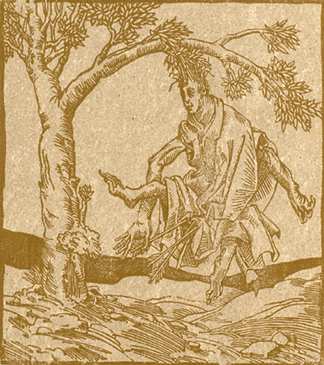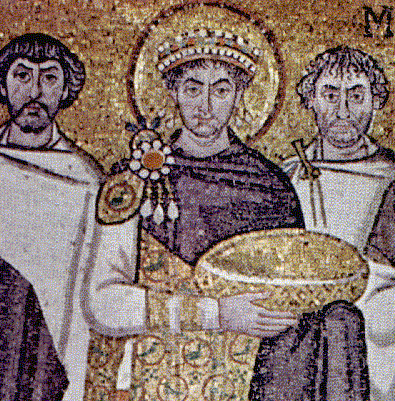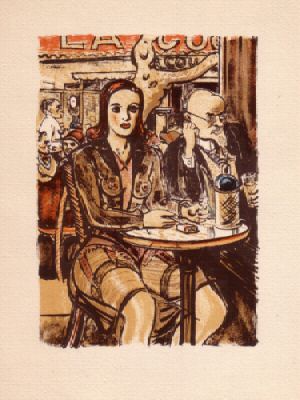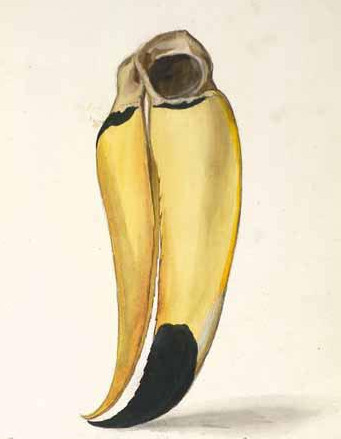FCWWBDNITHBR: Quentin Compson, Part 2: Fathers and Sons

Alright, let’s try to unpack this a little bit. (I’ll fall short to the task, but it’s got to be done—just a little bit).
Back, way on back, in the ill-lit and musty damp, moth-eaten recesses of the Old Testament, King David has a son (one of many, David got around—that whore) named Absalom. And Absalom had a sister Tamar, who was raped by their half-brother, Amnon. The Bible is pretty fucked up. Absalom takes his revenge on Amnon at a banquet to which all David’s sons were invited. He flees after the murder and returns to his father’s favor only to raise a revolt at Hebron. A successful revolt, until one of David’s spies delays Absalom and David’s armies have time to prepare. And then, “A battle was fought in the ‘wood of Ephraim’ and Absalom's army was completely routed. He himself, having long hair, was caught by his hair in the boughs of an oak-tree, and as David had strictly charged his men to deal gently with the young man, Joab was informed. What a common soldier refused to do even for a thousand shekels of silver, the king's general at once undertook. Joab thrust three spears through the heart of Absalom as he struggled in the branches and his ten armour-bearers came around and slew him.” Bummer. “Absalom, Absalom!” is the cry for lost sons in conflict with their fathers—an ironic conflict born out of filial piety, real or surrogate.
His father abandons some of his liberal pieties and land-owner’s snobbery, while he becomes closer to happiness and family contentment. Quentin’s path is opposite. He looses illusions, affectations, and gains greater understanding of his family, just like Turgenev’s protagonist in Fathers and Sons. But the realizations horrify Quentin, break him apart and stamp upon his self-consciously constructed defenses. He has to leave and go to the university. It leads him to nihilism, the kind of love of nothingness found in the profound suicide. Bazarov, the other nihilist in Fathers and Sons, succumbs to typhus, but a reconciliation of sorts, a closure at his grave occurs with his parents. For his bluster, Bazarov doesn’t wish to die, and something is left. All Quentin leaves behind is a shambles, the long slow road to degeneracy chronicled in Absalom, Absalom! and The Sound and the Fury.
And what, after all, does The Sound and the Fury signify? Nothing. It is the final last gasp of a dying family, older in its infancy that the piles of woes of the whole of America because the Compsons are older than America. And they were a sorry bunch then. They possessed the upper class dinginess of all proud people gone to seed. Quentin is named after his great-great-great-great grandfather, Quentin MacLachen Compson who fled Scotland for the Carolinas after the defeat of Bonnie Prince Charlie in 1749, and his great grandfather, Governor Quentin MacLachen Compson who would be, “the last Compson who would not fail at everything he touched save longevity or suicide.” Quentin’s ancestors were defeated at every turn and came to embrace their defeats and weaknesses as gamblers, drunks, and degenerates. Even the successful, like Quentin’s grandfather, were notable for their failures (General Jason Lycurgus Compson II, son of the Governor was defeated at Shiloh). And the Compson Mile that is the heart of Quentin’s world was traded from some Chickasaw, for a race horse. No noble land grants, no Southern ideal of gentle aristocracy, it’s all a sham.
Lycurgus is name that crops up on prominent occasions in the Compson line, being the middle name of no less than four Compson men including Quentin’s father, grandfather, and brother. Failures and lost causes dominate these men, from Bonnie Prince Charlie to Shiloh to Quentin’s single year at Harvard (the Compsons can afford no more, his education is a sham of respectability). Each of them attempting to out-do their fathers’ achievements until they realize that their fathers were failures and that they themselves shall fall still deeper. Lycurgus was a Thracian king who tangled with the cult of Dionysus and was driven mad for his troubles. “Going insane, Lycurgus mistook his father Dryas for a mature trunk of ivy, which is holy to Dionysus, and killed him, pruning away his nose and ears, fingers and toes. Zeus, to whom the oak (“dryas” in Greek) is sacred, struck him blind. An oracle then predicted that the land would stay dry and barren as long as Lycurgus was alive, so his people had him dismembered by wild horses. With Lycurgus dead, Dionysus lifted the curse.”
 It is in TSatF that Quentin kills himself, succumbs, as Faulkner said, to what he loved most: death. And that is Quentin’s contribution to the family he abandons in the solitude of death, his revelation that the struggle is for naught and to merely decay is to be best in a decaying world. Quentin sees through the falsehoods of “the Southern thing” as only a believer can and he jumps off of the Charles River Bridge in Cambridge after his first year of Harvard, that his father sold some of the Compson Mile to finance. “I don’t hate it,” he says, but he walks to the river and he goes in.
It is in TSatF that Quentin kills himself, succumbs, as Faulkner said, to what he loved most: death. And that is Quentin’s contribution to the family he abandons in the solitude of death, his revelation that the struggle is for naught and to merely decay is to be best in a decaying world. Quentin sees through the falsehoods of “the Southern thing” as only a believer can and he jumps off of the Charles River Bridge in Cambridge after his first year of Harvard, that his father sold some of the Compson Mile to finance. “I don’t hate it,” he says, but he walks to the river and he goes in.Labels: FCWWBDNITHBR, literature






0 Comments:
Post a Comment
<< Home